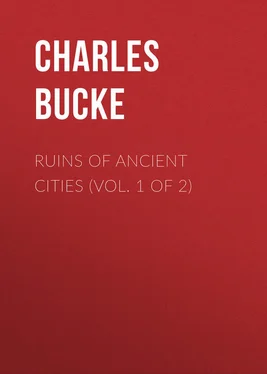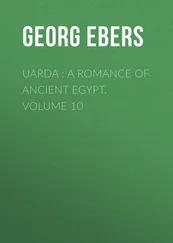Charles Bucke - Ruins of Ancient Cities (Vol. 1 of 2)
Здесь есть возможность читать онлайн «Charles Bucke - Ruins of Ancient Cities (Vol. 1 of 2)» — ознакомительный отрывок электронной книги совершенно бесплатно, а после прочтения отрывка купить полную версию. В некоторых случаях можно слушать аудио, скачать через торрент в формате fb2 и присутствует краткое содержание. Жанр: foreign_antique, foreign_prose, на английском языке. Описание произведения, (предисловие) а так же отзывы посетителей доступны на портале библиотеки ЛибКат.
- Название:Ruins of Ancient Cities (Vol. 1 of 2)
- Автор:
- Жанр:
- Год:неизвестен
- ISBN:нет данных
- Рейтинг книги:4 / 5. Голосов: 1
-
Избранное:Добавить в избранное
- Отзывы:
-
Ваша оценка:
- 80
- 1
- 2
- 3
- 4
- 5
Ruins of Ancient Cities (Vol. 1 of 2): краткое содержание, описание и аннотация
Предлагаем к чтению аннотацию, описание, краткое содержание или предисловие (зависит от того, что написал сам автор книги «Ruins of Ancient Cities (Vol. 1 of 2)»). Если вы не нашли необходимую информацию о книге — напишите в комментариях, мы постараемся отыскать её.
Ruins of Ancient Cities (Vol. 1 of 2) — читать онлайн ознакомительный отрывок
Ниже представлен текст книги, разбитый по страницам. Система сохранения места последней прочитанной страницы, позволяет с удобством читать онлайн бесплатно книгу «Ruins of Ancient Cities (Vol. 1 of 2)», без необходимости каждый раз заново искать на чём Вы остановились. Поставьте закладку, и сможете в любой момент перейти на страницу, на которой закончили чтение.
Интервал:
Закладка:
On the death of Cleopatra, Egypt was reduced into a province of the Roman empire, and governed by a prefect sent from Rome. Alexander founded the city in 3629; and the reign of the Ptolemies, who succeeded him, lasted to the year of the world 3974.
The city, in the time of Augustus, must have been very beautiful; for when that personage entered it, he told the natives, who had acted against him, that he pardoned them all; first, out of respect to the name of their founder; and, secondly, on account of the beauty of their city. This beauty and opulence, however, were not without their corresponding evils; for Quintilian informs us, that as Alexandria improved in commerce and in opulence, her inhabitants grew so effeminate and voluptuous, that the word Alexandrine became proverbial, to express softness, indelicacy, and immodest language.
Egypt having become a province of Rome, some of the emperors endeavoured to revive in it a love of letters, and enriched it by various improvements. The emperor Caligula was inclined to favour the Alexandrians, because they manifested a readiness to confer divine honours upon him. He even conceived the horrid design of massacring the chief senators and knights of Rome (A. D. 40), and then of abandoning the city, and of settling at Alexandria; the prosperity and wealth of which in the time of Aurelian was so great, that, after the defeat of Zenobia, a single merchant of this city undertook to raise and pay an army out of the profits of his trade!
The rapid rise of the power of the Moslems, and the religious discord which prevailed in Egypt, levelled a death-blow at the grandeur of this powerful city, whose prosperity had been unchecked from the time of its foundation; – upwards of nine hundred and seventy years. Amrou, the lieutenant of Omar, king of the Saracens, having entered Egypt, and taken Pelusium, Babylon, and Memphis, laid siege to Alexandria, and after fourteen months carried the city by assault, and all Egypt submitted to the yoke of the Caliphs. The standard of Mahomet was planted on the walls of Alexandria A. D. 640. Abulfaragius, in his history of the tenth dynasty, gives the following account of this catastrophe: – John Philoponus, a famous Peripatetic philosopher, being at Alexandria when the city was taken by the Saracens, was admitted to familiar intercourse with Amrou, the Arabian general, and presumed to solicit a gift, inestimable in his opinion but contemptible in that of the barbarians, and this was the royal library. Amrou was inclined to gratify his wish, but his rigid integrity scrupled to alienate the least object without the Caliph's consent. He accordingly wrote to Omar, whose well-known answer was dictated by the ignorance of a fanatic.
Amrou wrote thus to his master, "I have taken the great city of the West. It is impossible for me to enumerate the variety of its riches and beauty; I shall content myself with observing, that it contains 4000 palaces, 4000 baths, 400 theatres or places of amusement, 12,000 shops for the sale of vegetable food, and 40,000 tributary Jews." He then related what Philoponus had requested of him. "If these writings of the Greeks," answered the bigoted barbarian, his master, "agree with the Koran, or book of God, they are useless, and need not be preserved; if they disagree they are pernicious, and ought to be destroyed." This valuable repository, therefore, was devoted to the flames, and during six months the volumes of which it consisted supplied fuel to the four thousand baths, which gave health and cleanliness to the city. "No complaint," says a celebrated moralist (Johnson), "is more frequently repeated among the learned, than that of the waste made by time among the labours of antiquity. Of those who once filled the civilised world with their renown nothing is now left but their names, which are left only to raise desires that never can be satisfied, and sorrow which never can be comforted. Had all the writings of the ancients been faithfully delivered down from age to age, had the Alexandrian library been spared, and the Palatine repositories remained unimpaired, how much might we have known of which we are now doomed to be ignorant, how many laborious inquiries and dark conjectures, how many collations of broken hints and mutilated passages might have been spared! We should have known the successions of princes, the revolutions of empires, the actions of the great, and opinions of the wise, the laws and constitutions of every state, and the arts by which public grandeur and happiness are acquired and preserved. We should have traced the progress of life, seen colonies from distant regions take possession of European deserts, and troops of savages settled into communities by the desire of keeping what they had acquired; we should have traced the progress and utility, and travelled upward to the original of things by the light of history, till in remoter times it had glimmered in fable, and at last been left in darkness." – "For my own part," says Gibbon, "I am strongly tempted to deny both the fact and the consequences." Dr. Drake also is disposed to believe, that the privations we have suffered have been occasioned by ignorance, negligence, and intemperate zeal, operating uniformly for centuries, and not through the medium of either concerted or accidental conflagration 20 20 See his observations on the supposed conflagration of the Alexandrian library, with a commentary on the 5th and 6th sections of the first chapter of the tenth book of Quintilian.
.
The dominion of the Turks, and the discovery of the Cape of Good Hope, in 1499, completed its ruin; and from that time it has remained in decay. Its large buildings fell into ruins, and under a government which discouraged even the appearance of wealth, no person would venture to repair them, and mean habitations were constructed in lieu of them, on the sea-coast. Since that dismal epoch Egypt has, century after century, sunk deeper and deeper into a state of perfect neglect and ruin. In recent times, however, it has been under the immediate despotic rule of Mehemet Ali, nominally a pasha of the sultan of Constantinople, and a man apparently able and willing to do much towards restoring civilisation to the place of his birth.
The remains, in the opinion of some, have been greatly magnified. One writer 21 21 Rees.
, for instance, states, "The present state of Alexandria affords a scene of magnificence and desolation. In the space of two leagues, inclosed by walls, nothing is seen but the remains of pilasters, of capitals, and of obelisks, and whole mountains of shattered columns and monuments of ancient art, heaped upon one another, and accumulated to a height even greater than that of the houses." Another writer 22 22 Browne.
says, "Alexandria now exhibits every mark by which it could be recognised as one of the principal monuments of the magnificence of the conqueror of Asia, the emporium of the East, and the chosen theatre of the far-sought luxuries of the Roman triumvirs and the Egyptian queen."
According to Sonnini, columns subverted and scattered about; a few others still upright but isolated; mutilated statues, fragments of every species, overspread the ground which it once occupied. "It is impossible to advance a step, without kicking, if I may use the expression, against some of its wrecks. It is the hideous theatre of destruction the most horrible. The soul is saddened on contemplating those remains of grandeur and magnificence; and it is raised into indignation against the barbarians, who dared to apply a sacrilegious hand to monuments, which time, the most pitiless of destroyers, would have respected." "So little," says Dr. Clarke, "are we acquainted with these valuable remains, that not a single excursion for purposes of discovery has yet been begun; nor is there any thing published with regard to its modern history, excepting the observations that have resulted from the hasty survey, made of its forlorn and desolated havens by a few travellers whose transitory visits ended almost with the days of their arrival 23 23 A very curious instance is afforded by Bruce, who wrote an account of Alexandria, and, literally, did not spend one entire day in the city. He was at sea on the morning of the 20th of June, 1768, previously to his landing in Alexandria, (see Bruce's Travels, v. i. p. 7,) and in the afternoon he left that city for Rosetta. – Clarke.
."
Интервал:
Закладка:
Похожие книги на «Ruins of Ancient Cities (Vol. 1 of 2)»
Представляем Вашему вниманию похожие книги на «Ruins of Ancient Cities (Vol. 1 of 2)» списком для выбора. Мы отобрали схожую по названию и смыслу литературу в надежде предоставить читателям больше вариантов отыскать новые, интересные, ещё непрочитанные произведения.
Обсуждение, отзывы о книге «Ruins of Ancient Cities (Vol. 1 of 2)» и просто собственные мнения читателей. Оставьте ваши комментарии, напишите, что Вы думаете о произведении, его смысле или главных героях. Укажите что конкретно понравилось, а что нет, и почему Вы так считаете.












